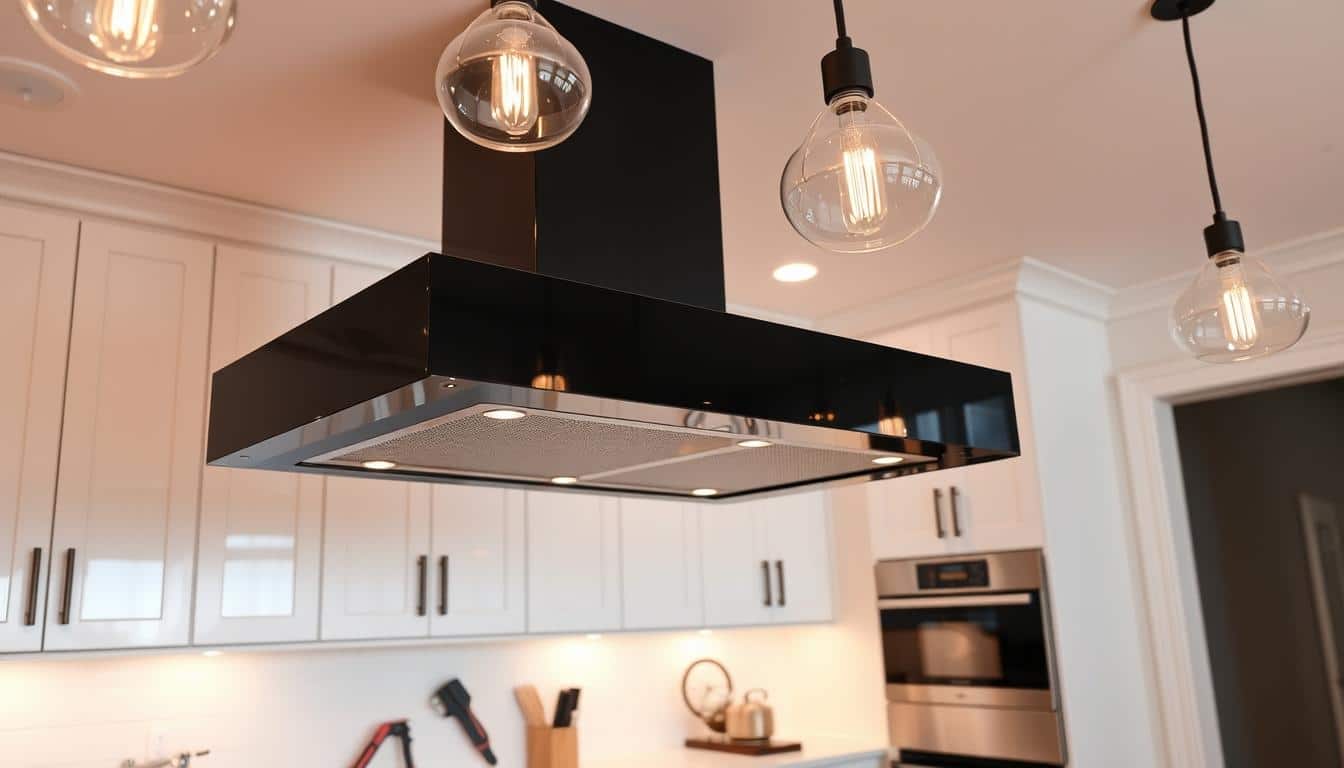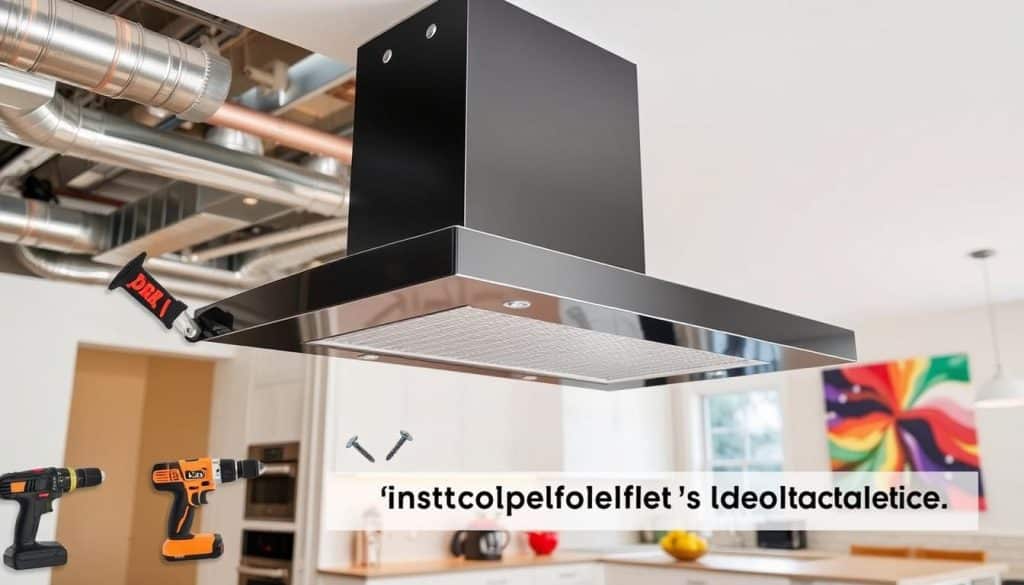Installing Black Stainless Steel Range Hoods
Choosing to install a black stainless steel range hood is a smart move for your kitchen redo. It’s not just about looks; it offers a lot more. These hoods pull smoke, smells, and harmful gases out of your kitchen. This keeps your space clean and safe. More than 200 dangerous gases can come from cooking, making a range hood a must-have1. Whether updating or starting from scratch, a sleek black hood adds function and flair.
Key Takeaways
- Black stainless steel range hood installation complements modern kitchen designs.
- These hoods efficiently remove smoke, odors, and steam1.
- Kitchen range hood installation improves air quality by reducing harmful gases1.
- The range hood should be placed between 24-30 inches above the stovetop for optimal functionality2.
- Protective gear like goggles and dust masks are essential for safety during installation2.
Why Choose a Black Stainless Steel Range Hood?
Installing a black stainless steel range hood can make your kitchen look better. It brings a modern and sleek look. It matches well with other black steel appliances, which many young homeowners like3. People are choosing black power range hoods for a more stylish and advanced kitchen look4. Also, these hoods are affordable, making them popular for those wanting style without spending too much4.
Black stainless steel hoods are great because they don’t show smudges easily. This means they stay clean with less work5. However, regular stainless steel hoods show marks and fingerprints more and need cleaning often3. Yet, many prefer stainless steel for its durability, low upkeep, and how it looks in modern kitchens35.
Stainless steel hoods bring a timeless elegance to any kitchen, fitting many styles4. They’re durable and resist water, rust, or corrosion well5. But for a cozy and up-to-date kitchen vibe, black stainless steel is better. Their matte finish makes the kitchen feel warm and inviting4.
In the end, choosing between black or traditional stainless steel hoods depends on your kitchen style and needs. Both offer major benefits. It’s all about finding a hood that meets your taste, needs, and budget. Now, improving your kitchen’s look and function is simple.
Preparing Your Kitchen for Range Hood Installation
Are you ready to put in a black stainless steel range hood? This guide makes the process smooth and easy. It helps you dodge any problems that might pop up.
Gather Necessary Tools and Materials
First, grab everything you need for the job. This list includes measuring tape, level, utility knife, pencil, and screwdrivers. Don’t forget ductwork and supplies for mounting. Having all in place saves time and avoids stops and starts.
Clearing the Installation Area
Now, make space where you’ll set up the hood. Clear off countertops and nearby areas. This makes working easier and keeps accidents at bay during setup.
Safety Precautions
Safety first, always. Cut off electricity to avoid shocks. Know and follow your local building rules for a safe setup. If the work seems tough, like rewiring or venting, get a pro67. Taking these steps ensures a secure installation.
Types of Black Stainless Steel Range Hoods
Finding the right range hood is key for a good kitchen setup. Black stainless steel range hoods have different types for all kitchen styles. We’ll look at the main types and what they offer.
Wall Mount Range Hoods
Wall mount range hoods fit kitchens with wall-bound stoves or cooktops. They’re a bold design choice that also improves air quality. The FOTILE Slant Vent 30-in model, for example, offers 1100 CFM of power for strong ventilation8. The ZLINE Autograph Edition 36-in model is also highly rated, with a 4.6-star rating from 301 reviews8.
The Samsung 30-in wall mount model offers 390 CFM for effective air flow and comes with LED lights for better kitchen visibility9. It’s also rated #1 in service experience, showing its reliability9. Installing these needs proper support and ventilation to work best.
Under Cabinet Range Hoods
If your kitchen is tight on space, consider an under cabinet range hood. They fit under cabinets, offering good ventilation without taking up space. The LG 30-in model provides 600 CFM and includes a free extra year of warranty8. The Hauslane 30-in model is also a great pick, with a 4.4-star rating from 226 reviews8.
Range Hood Insert Installation
Range hood inserts blend into custom cabinets or pre-existing hoods for a smooth look. They come with different motors and can move air from 280 to 1260 CFM10. You can find guides for easy installation, and customization options to fit your kitchen design10.
Choosing the Right Range Hood for Your Kitchen
When you pick a kitchen range hood, thinking about many factors is key. You want to ensure it works well and looks good in your kitchen. Matching the range hood with your other kitchen stuff and picking the right kind of venting are important steps.
Matching with Kitchen Appliances
It’s important to choose a range hood that looks good with your kitchen appliances. For instance, a stainless steel hood should go well with other stainless steel items for a united look. The hood’s finish and color should either match or highlight your kitchen tools, making your kitchen look better.
Considering Ventilation Types
It’s crucial to choose between a ducted system and a duct-free system for your hood. Ducted systems, which send air outside, usually work better. They should be placed on an outside wall to work best11. Duct-free systems, on the other hand, clean and recirculate the air. They’re not as good and need regular filter changes12. Knowing these differences helps you pick the best option for your kitchen.
Step-by-Step Guide to Black Stainless Steel Range Hood Installation
Starting to install a stove hood or range hood insert involves detailed steps. These steps keep your kitchen safe and efficient. Follow the guidelines closely for a successful setup.
Marking Installation Spots
First, mark where you’ll install the hood. The distance from your cooktop affects this: standard hoods go 18 to 24 inches above, while bigger hoods sit 24 to 30 inches above. Always check your city’s building codes to be sure1314.
Running Ductwork
Then, set up the ductwork. You’ll likely use a 6-inch duct for venting14. Ensure every connection is tight with aluminum tape. This tape also stops leaks at the wall caps14. Put on safety goggles and gloves to keep yourself safe during the work14.
Securing the Range Hood
With the ductwork ready, it’s time to install the hood. Carefully follow the guide that came with your hood for your model’s instructions. Remember, older homes before 2000 may need a 3-prong plug. Newer homes usually require a 4-prong plug13. Make sure the hood is tightly fixed to either the wall or cabinets for the best performance.
By accurately following these instructions, you’ll achieve a successful and smooth stove hood or range hood insert installation. This will make your kitchen not just look better but work better too.
Tools You Need for a Successful Installation
Installing a kitchen range hood or a stainless steel hood requires some key tools. These tools make the job accurate, safe, and quick. It’s important to know what you need before you start.
Measuring Tape and Level
A measuring tape helps you place the range hood at the perfect distance from the cooktop. This is usually between 28″ and 36″ for it to work best15. A level makes sure your hood is straight. This keeps it looking good and working right.
Utility Knife and Pencil
You’ll need a sharp utility knife and a pencil for marking and cutting. These are used to cut out panels for duct access15. Always measure twice before you cut to avoid mistakes.
Screwdrivers and Safety Gear
Different screwdrivers are needed for fixing screws and putting parts together. Wearing safety gear is a must to stay safe16 and17. Goggles protect your eyes and gloves keep your hands safe from harm.
Having these tools at hand will smooth out the installation of your kitchen range hood or stainless steel hood. Remember, being safe and precise is key to a successful install.
Benefits of a Vented Range Hood
A vented range hood can make your kitchen better. Vented range hood benefits include smoke and odor removal. They also eliminate grease and harmful vapors, making kitchens cleaner and safer18.
Vented range hoods also take away extra heat from cooking. This makes your kitchen cooler18. They can even help you save money on bills with their LED lighting18.
Houses with good range hoods sell faster and for more money. So, they’re a smart move money-wise18. This makes them a great choice not just for now, but also for the future19.
They also cut down on cleaning time. By venting grease outdoors, your kitchen stays cleaner19. They also remove carbon monoxide, which means better air and safer homes19.
Common Challenges and How to Overcome Them
Putting in a black stainless steel range hood has its hurdles. Homeowners face issues such as ductwork and electrical problems during installation. It’s important to be ready to tackle these for smooth setup work.
Handling Ductwork Issues
Ductwork problems are common during setup. If ducts aren’t put in right, your range hood won’t vent well and won’t work as it should. To fix this, plan your duct layout carefully. Make sure it’s as straight as possible. This reduces airflow issues. It’s also key to keep your ducts clean and check for clogs20.
Dealing with Electrical Connections
Electrical issues are another big challenge. Problems can come from bad wiring or faulty parts. To avoid trouble, do routine checks21. Trouble might show up as a fan that doesn’t work. This could be due to a bad switch or motor20. Handling electrical parts carefully can prevent danger and keep your hood working well and safely.
Common issues include the range hood not starting, making noises, or not clearing smoke. Even lights and fans can malfunction20. Check parts like the circuit board and switches to fix these problems. Cleaning filters and checking for clogs can stop these problems before they start21.
To beat installation challenges, plan well, do things carefully, and keep up with maintenance. Handling ductwork and electrical issues correctly ensures a good and effective setup.
If you need more help with your range hood, look at this guide20 or get expert advice21.
Integrating a Black Stainless Steel Range Hood with Existing Appliances
Adding a black stainless steel range hood to your kitchen is effortless and boosts its look. It’s all about making sure the new hood fits in well with your other appliances. We’ll look at two main ways to do this: matching with black appliances and mixing with traditional ones.
Matching with Black Stainless Steel Appliances
Black stainless steel brings a fresh, modern vibe to kitchens. It’s becoming more popular, so finding a matching range hood is simple. Whirlpool has black stainless steel range hoods with cool features like LED lights, quiet technology, and a strong fan22. These options ensure you can easily update your kitchen with the latest technology and style.
Combining with Stainless Steel Appliances
Mixing a black stainless steel range hood with traditional ones creates an eye-catching contrast. This mix keeps your kitchen looking unified and stylish. Stainless steel hoods fit well with any decor22. You can choose from under-cabinet, wall-mounted, or island hoods, depending on your kitchen’s needs and your taste.
| Type of Range Hood | Cost Range | Common Features |
|---|---|---|
| Under-Cabinet | $75 – $500 | Discrete Ventilation, Built-In Look |
| Wall-Mounted | $160 – $700 | Bold Style Statement, Efficient Ventilation |
| Island | $320 – $1,000 | Suspended from Ceiling, Integrated Look |
The cost and installation time for a new range hood can greatly vary. For example, installing a hood takes about one to two hours, cost around $750 on average. Prices range from $175 to $3,15023. Picking the right range hood means your kitchen won’t just look good, it’ll work well too.
Maintaining Your Black Stainless Steel Range Hood
It’s important to keep your black stainless steel range hood in good shape. This means regular cleaning and check-ups. Doing this keeps it looking great and working well.
Cleaning Tips
Cleaning your range hood often is a must. Frigidaire’s Black Stainless Steel appliances have Smudge-Proof™ technology. This makes them less likely to get fingerprints and smudges24. Use warm water and a soft cloth for cleaning24. Stay away from harsh cleaners and bleach24.
There are three ways to clean stainless steel: glass cleaner, vinegar and water, or dish soap and water25. For hard-to-remove grease, kitchen degreaser or acetone works well25. To bring back the shine, a bit of olive oil or coconut oil will do25.
Regular Maintenance Checks
Along with cleaning, check your range hood regularly. Make sure the filters and vents are working right. Change filters as recommended and keep ducts clear.
Frigidaire suggests a new PureSource™ water filter every six months for some fridges24. They also recommend a new PureAdvantage™ air filter every six months for fresh air24. Proper setup and the right settings can keep your fridge running efficiently24.
Clean as often as you cook to avoid tough stains and grease. Regular care keeps your range hood in the best shape. This makes your kitchen cleaner and healthier.
Safety Tips for Range Hood Installation
Installing a range hood safely means following key steps. Turning off the electrical power is vital to avoid accidental shocks. You should use the right tools, like a measuring tape and a level. This helps mount your range hood securely and prevents accidents26.
It’s critical to use the duct size and type the manufacturer suggests. Rigid ducting is needed for high-performance hoods to work well and quietly27. Flexible ducting, on the other hand, can lower performance and might crack. This could lead to costly repairs27.
In places like high-rise condos, you might need to install a ductless range hood. Always check local building codes and follow their rules, for example, keeping a 30-inch space above a gas range26.
Also, paying attention to the right mounting distances is important for good ventilation. For outdoor hoods, mounting them 36 to 42 inches high works best28. And for hoods rated at 2000 CFM, use at least a 10-inch duct for better air flow28.
Securing the range hood well is key to avoid accidents. People usually use aluminum tape and silicone to fix ductwork. Also, having a separate electrical line for the hood prevents electrical issues26.
Don’t forget about yearly maintenance like cleaning. Keeping the hood, filters, and ducts clean is essential. It keeps the hood working well and reduces the risk of fires28. By taking these safety steps seriously, your range hood installation will be safer and more effective.
Expert Tips for Installing a Black Stainless Steel Range Hood
Installing a black stainless steel range hood requires careful planning. Start by making sure you have all the tools and materials you need. It’s also wise to measure the hood and your cooktop beforehand. Choose a hood slightly wider than your cooktop to effectively catch vapor and smoke29. Also, your range hood should have at least 400 CFM for professional-style stoves29.
To get the best out of your hood, make sure the ductwork is well aligned and sealed. This helps prevent leaks and boosts efficiency. Having the ductwork done right also means your installation meets code standards. If the electrical work seems complicated, consider hiring a professional for safety and accuracy. Hoods with a noise level of 3 sones or less are preferred for quieter operation29.
When installing, protect your work area and possibly use a helper for heavy chimneys. Always find the studs in the wall to secure the hood properly. And don’t forget to thoroughly read the installation guide before you start29. Following these steps will make installing your black stainless steel range hood easier and help avoid common mistakes.








